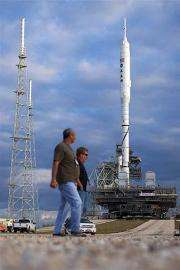NASA is 'go' for crucial rocket test

NASA is set to blast off a prototype rocket on Tuesday that carries hopes of returning humans to the Moon, and for the first time to Mars, despite deep uncertainty about the program's future.
The space agency said everything is in order for Tuesday's two-minute, 30-second test of the Ares I-X rocket, a first look at the launch vehicle designed to replace NASA's aging space shuttle fleet.
It is "an early opportunity to test and prove flight characteristics, hardware, facilities and ground operations associated with the Ares I," the space agency said.
Data will be collected from over 700 sensors spread across Ares I-X, providing a stream of information that will be scrutinized for months.
But more rides on the launch than data.
It is the culmination of three years work on Constellation, a human space flight program conceived by former president George W. Bush in the wake of the 2003 Columbia shuttle disaster that killed all seven crew onboard.
The program includes plans to create "Orion," the space shuttle's successor that by 2017 would carry astronauts into space in a bid to return to the moon and later make a first human trip to Mars.
But an independent panel of experts threw cold water over Constellation's starry-eyed aspirations in a report to US President Barack Obama on Thursday, warning that NASA needs three billion dollars a year more to meet its goals.
"The US human space flight program appears to be on an unsustainable trajectory" due to lack of funds, panel leader Norman Augustine, former president of aerospace giant Lockheed Martin, said in the 155-page report.
The 10-member-panel floated the idea of manned space flights to asteroids, and flyovers close to the moon and Mars, both projects that would not require complicated landing arrangements.
For Obama, who leads an increasingly cash-strapped nation, that may sound like a good option.
In the face of this uncertainty NASA scientists are trying to appear workman-like.
"The team is ready to go fly; the vehicle is ready to go fly," said Ares I-X launch director Ed Mango, estimating a 40 percent chance of favorable weather conditions for launch at 8:00 am (1200 GMT) from the Kennedy Space Center in Cape Canaveral, Florida.
Launch countdown preparations will begin on Monday and the actual countdown is scheduled to begin Tuesday at 1:00 am (0500 GMT).
NASA has one more launch window opportunity on Wednesday should stormy weather scuttle the launch plans.
Doug Cooke, associate administrator of NASA's Exploration Systems Mission Directorate, remained upbeat about the Ares prospects.
"This test is very important," he told reporters on Friday. "The data is important to us regardless of what comes next."
Only the first stage of Ares I-X -- a modified solid-fuel motor from the shuttle program -- will be tested, while the upper stage and capsule are mock ups.
The upper stage will plunge into the Atlantic Ocean after reaching a maximum altitude of 150,000 feet (45,720 meters).
The rocket measures 327 feet (99.6 meters) -- 33 feet (10 meters) taller than the Statue of Liberty in New York.
(c) 2009 AFP


















